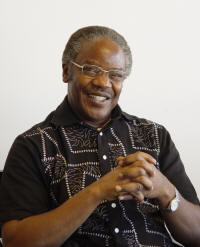University
Communications
Office
Arkansas State University
Jonesboro,
Arkansas
Staff
Markham Howe
Sara McNeil
Gina Bowman
(870) 972-3056
fax (870) 972-3069
More information:
NewsPage
Links to News Releases
& Announcements
Campus Calendar
Public activities at ASU
About
ASU
Overview, history
and more |
Dr. Allan K. Birabi of Makerere University,
Uganda, is Fulbright Visiting Scholar
Nov. 26, 2008 -- Dr. Allan Kenneth Birabi, of Makerere University,
Kampala, Uganda, visited Arkansas State University-Jonesboro as a
Fulbright Visiting Scholar this semester, from September-November, 2008. A lecturer and architectural
conservator in Makerere University’s Department of Architecture, Dr.
Birabi focused on research to help him design a course and curriculum in
Built Heritage Conservation Management. Dr. Birabi selected ASU for his
research due to ASU’s unique PhD program in Heritage Studies, under the
direction of Dr. Clyde A. Milner II. Dr. Birabi also believed that ASU’s
centrality in the United States was important, since this visit to
Arkansas marked his first visit to the United States.
semester, from September-November, 2008. A lecturer and architectural
conservator in Makerere University’s Department of Architecture, Dr.
Birabi focused on research to help him design a course and curriculum in
Built Heritage Conservation Management. Dr. Birabi selected ASU for his
research due to ASU’s unique PhD program in Heritage Studies, under the
direction of Dr. Clyde A. Milner II. Dr. Birabi also believed that ASU’s
centrality in the United States was important, since this visit to
Arkansas marked his first visit to the United States.
Recipients of Fulbright awards are selected on the basis of academic and
professional achievement, as well as demonstrated leadership potential
in their fields. Dr. Birabi holds a bachelor of arts degree in Fine Arts
from Makerere University; a post-graduate degree in Art Education (Makerere);
a master’s degree in Fine Arts (Makerere); an M. Phil degree in
Architecture from the University of Newcastle, Newcastle-upon-Tyne,
U.K.; postgraduate diplomas in Conservation and Management of Historic
Buildings and Urban Shelter, Design, and Development, both from Lund University, Sweden; and a PhD in
Architectural Conservation from a collaboration of five universities, of
which Makerere University was the final awarding institution. Dr. Birabi is
married to Olive Birabi, and they have four children. His wife is also an academic.
While at ASU, Dr. Birabi presented several lectures, including “The
Power of Cultural Semiotics in the Built Environment: Case
Study—Africa,” in which he provided fine arts students with an overview
of the cultural geography of Africa in the 11th-14th
centuries. He also presented a lecture, “The Context of Built Heritage
Conservation Education in the United States of America,” to students in
the Heritage Studies PhD program. This presentation summed up Dr.
Birabi’s research in the United States. His research was focused on
developing a model for creating and promoting a cultural and historic
architectural preservation post-doctoral program in Uganda.
“Uganda has few heritage resources in terms of architecture,” Dr. Birabi
noted, “and those that exist are products of 19th -century
and 20th-century colonial architecture. Some of them are
threatened, because sometimes the post-colonial intelligentsia believes
these buildings are a symbol of cultural oppression, and so should be
eliminated. These same people believe that only newer buildings, the
products of Uganda’s independence, should be noteworthy.”
Dr. Birabi continues, “ I am interested in the architectural phenomena
of embodied energy, the energy it took to build these 19th-
and 20th –century buildings—the energy used to transport
materials, the energy used to collect the materials, energy used to
design the buildings, and the energy in labor that it took to build
them. That energy is a resource that is precious, just as the materials
are precious resources. So historic buildings are our biggest reserve of
embodied energy, and therefore, we should preserve them. They have
architectural value, and they did contribute to our national
development. These colonial buildings have unique features, excellent
quality construction and materials, and good design. If we want to
develop cultural tourism and help to develop our economy, we need to
preserve these buildings.”
The impetus to seek the Fulbright award was, for Dr. Birabi, based on
researching a model academic program that could benefit his country, and
ASU, with its PhD in Heritage Studies, was an excellent fit—central
enough to perform research, and comfortably temperate in climate.
Through a methodology that was both qualitative and quantitative, he
succeeded in finding the best pathway for historic preservation
education adaptable to developing countries, using Uganda as a case
study. He stresses the importance of interdisciplinarity in such a
program, and was able to observe interdisciplinarity at work in ASU’s
Heritage Studies program. He hopes to use his paper, “The Context of
Built Heritage Conservation Education in the United States of America”
to develop an integrated mode of education for the curriculum and course
design of a Built Heritage Conservation Management program when he
returns to his home university in Africa.
Dr. Birabi is one of approximately 850 outstanding foreign faculty and
professionals who will teach and do research in the United States
through the Fulbright Visiting Scholar Program. The Fulbright Program,
America’s flagship international exchange program, is sponsored by the
United States Department of State’s Bureau of Educational and Cultural
Affairs.
Since its establishment in 1946 under legislation introduced by the late
Senator J. William Fulbright of Arkansas, the Fulbright Program has
provided approximately 286,500 people—108,160 Americans who have
studied, taught, or researched abroad, and 178,340 students, scholars,
and teachers from other countries who have engaged in similar activities
in the United States—with the opportunity to observe each others’
political, economic, educational, and cultural institutions, to exchange
ideas, and to embark on joint ventures of importance to the general
welfare of the world’s inhabitants. The Fulbright Program operates in
more than 155 countries worldwide.
For more information on the Fulbright Program, or the U.S. Department of
State’s Bureau of Educational and Cultural Affairs, visit
http://fulbright.state.gov,
contact James A. Lawrence, Office of Academic Exchange Programs, at
(202) 453-8531, or e-mail
fulbright@state.gov.
###
|
